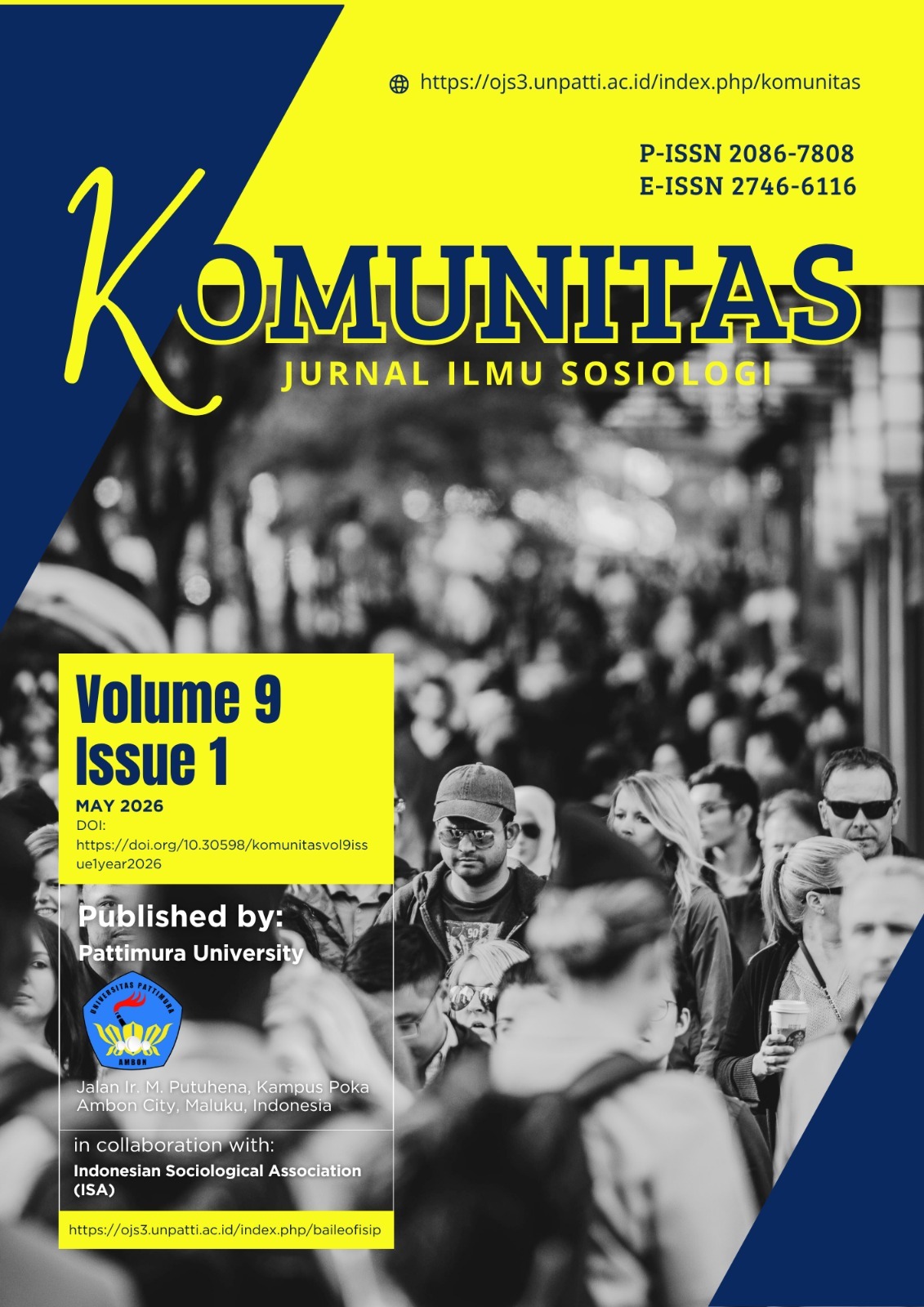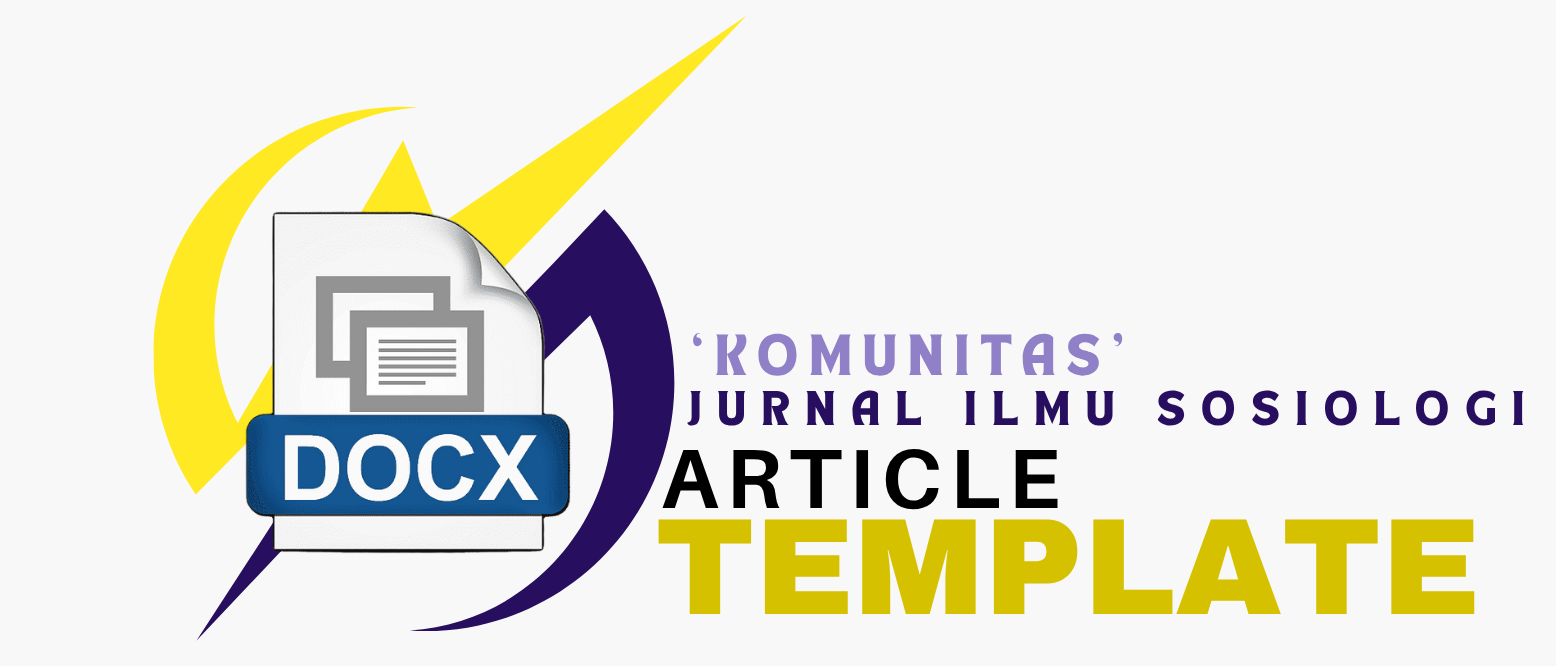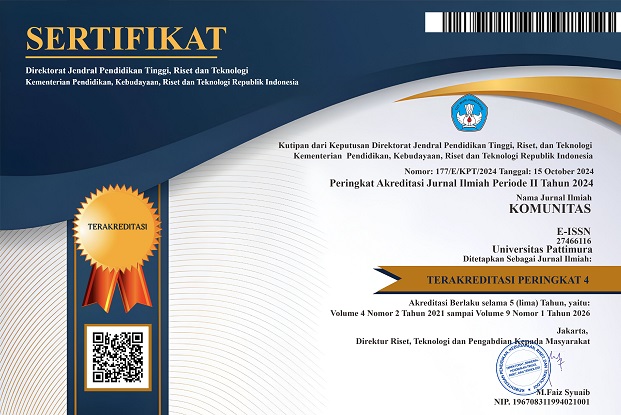Women, Work, and Family: A Sociological Study on Female Income Contribution in Rural Maluku Communities
Abstract
This study aims to analyze women’s economic contribution to household income and the dynamics of their dual roles within rural communities in Maluku, particularly in Sawai Village. Although men are traditionally recognized as primary breadwinners, socio-economic transformations have encouraged women to engage in productive activities such as farming, trading, tailoring, and public employment, yet their contributions remain socially and statistically undervalued. Using a qualitative approach within the framework of economic sociology and gender studies, this research employs in-depth interviews, participant observation, and social documentation, analyzed thematically through categories of economic contribution, domestic roles, social perception, and gender adaptation. The findings reveal that women in Sawai play a significant role in sustaining household economies, contributing an average of 28.38% to total income, with the highest contribution (42.70%) coming from formal employment. These results indicate a shift in the gendered division of labor, as women become integral to household economic structures despite limited social recognition under prevailing patriarchal norms. The study’s novelty lies in applying a locally grounded economic sociology perspective to postcolonial rural Maluku, integrating quantitative and qualitative insights. Theoretically, it advances discourse on gendered economic participation, while practically offering policy implications for culturally sensitive women’s economic empowerment in Indonesia’s eastern rural contexts.
Downloads
References
Adnan, G., & Amri, K. (2021). Do gender empowerment and democracy reduce poverty rate? A cross-provinces evidence from western Indonesia. Economics & Sociology, 14(3), 54–71. https://doi.org/10.14254/2071-789X.2021/14-3/3
Afdhal, A. (2023). Intersecting Voices: Gender, Religion, and Language Practices among University Students in Eastern Indonesia. Jurnal Tahuri, 20(2), 173–184. https://doi.org/10.30598/tahurivol20issue2page173-184
Afdhal, A. (2025). Perceived Standardness and Local Language Features in Academic Writing: A Sociolinguistic Study of Ambonese Students in Indonesia. Jurnal Tahuri, 22(2 SE-Articles). https://doi.org/10.30598/tahurivol22issue2page120-136
Afdhal, A., & Kurniawati, A. (2025). Menghidupkan Kembali Budaya Baca: Peran Perempuan dan Tradisi Lokal dalam Revitalisasi Literasi di Maluku Tenggara. Populis: Jurnal Ilmu Sosial Dan Ilmu Politik, 17(2), 184–198. https://doi.org/10.30598/populis.17.2.184-198
Alfons, C. R., & Frans, J. F. (2023). Kaum Perempuan Desa Waimital Kecamatan Kairatu Kabupaten Seram Bagian Barat di Masa Pandemik COVID-19. KOMUNITAS: Jurnal Ilmu Sosiologi, 5(2), 137–142. https://doi.org/10.30598/komunitasvol5issue2page137-142
Beckert, J. (2021). The Firm as an Engine of Imagination: Organizational prospection and the making of economic futures. Organization Theory, 2(2), 225–240. https://doi.org/10.1177/26317877211005773
Buttel, F. H., & LaRamee, P. (2021). The “Disappearing Middle”: A Sociological Perspective. In Towards a New Political Economy of Agriculture (pp. 151–169). Routledge. https://doi.org/10.4324/9780429269493-9
Buvinic, M., Knowles, J. C., & Witoelar, F. (2022). The unfolding of women’s economic empowerment outcomes: Time path of impacts in an Indonesia trial. World Development, 158(12), 105974. https://doi.org/10.1016/j.worlddev.2022.105974
Dadi, D. (2021). Women Empowerment in Indonesia: Community Learning Activity Center Programs. AL-ISHLAH: Jurnal Pendidikan, 13(3), 1823–1834. https://doi.org/10.35445/alishlah.v13i3.1152
Georgios, C., Nikolaos, N., & Michalis, P. (2021). Neo‐Endogenous Rural Development: A Path Toward Reviving Rural Europe*. Rural Sociology, 86(4), 911–937. https://doi.org/10.1111/ruso.12380
Granovetter, M. (2018). The Impact of Social Structure on Economic Outcomes. In The Sociology of Economic Life (pp. 46–61). Routledge. https://doi.org/10.4324/9780429494338-4
Has, E. M. M., Efendi, F., Wahyuni, S. D., Mahmudah, I. Z., & Chotimah, K. (2022). Women’s Empowerment and Sociodemographic Characteristics as Determinant of Infant and Young Child Feeding Practice in Indonesia. Current Research in Nutrition and Food Science Journal, 10(2), 607–619. https://doi.org/10.12944/CRNFSJ.10.2.17
Hermawati, W., Ririh, K. R., Ariyani, L., Helmi, R. L., & Rosaira, I. (2023). Sustainable and green energy development to support women’s empowerment in rural areas of Indonesia: Case of micro-hydro power implementation. Energy for Sustainable Development, 73(6), 218–231. https://doi.org/10.1016/j.esd.2023.02.001
Hidayati, A. F., & Siregar, Y. A. (2024). Commodification of Local Culture in The Development of Wayang Villages Tourism. Bai, 1(2), 176–191. https://doi.org/10.30598/baileofisipvol1iss2pp176-191
Hukunala, M., Angkotasan, S., & Mahulauw, S. (2022). Aspirasi Afektif dan Hasrat yang Dimediasi: Peran Media Sosial dan Drama Korea dalam Membentuk Idealisme Romantis Kalangan Mahasiswa di Ambon. Populis: Jurnal Ilmu Sosial Dan Ilmu Politik, 17(1), 105–120. https://doi.org/10.30598/populis.17.1.105-120
Hyunanda, V. F., Palacios Ramírez, J., López-Martínez, G., & Meseguer-Sánchez, V. (2021). State Ibuism and Women’s Empowerment in Indonesia: Governmentality and Political Subjectification of Chinese Benteng Women. Sustainability, 13(6), 3559. https://doi.org/10.3390/su13063559
Ipa, N., Sopamena, J. F., & Adam, F. P. (2025). Peran Perempuan dalam Pemenuhan Nafkah Rumah Tangga di Desa Masihulan Kecamatan Seram Utara Kabupaten Maluku Tengah. KOMUNITAS: Jurnal Ilmu Sosiologi, 8(1), 1–13. https://doi.org/10.30598/komunitasvol8issue1page1-13
Kodithuwakku, S. S. (2022). Qualitative Methods for Policy Analysis: Case Study Research Strategy. In J. Weerahewa & A. Jacque (Eds.), Agricultural Policy Analysis (pp. 179–193). Springer Singapore. https://doi.org/10.1007/978-981-16-3284-6_7
Kunjuraman, V., Hussin, R., & Aziz, R. C. (2022). Community-based ecotourism as a social transformation tool for rural community: A victory or a quagmire? Journal of Outdoor Recreation and Tourism, 39(12), 100524. https://doi.org/10.1016/j.jort.2022.100524
Laskar, M. H. (2023). Examining the emergence of digital society and the digital divide in India: A comparative evaluation between urban and rural areas. Frontiers in Sociology, 8(4), 1145221. https://doi.org/10.3389/fsoc.2023.1145221
Latuconsina, H., Sopamena, J., & Kaplale, R. (2023). Peran dan Kontribusi Perempuan Papalele Terhadap Pendapatan Rumah Tangga di Desa Pelauw, Kecamatan Pulau Haruku, Kabupaten Maluku Tengah. KOMUNITAS: Jurnal Ilmu Sosiologi, 6(2), 119–129. https://doi.org/10.30598/komunitasvol6issue2page119-129
Li, P., Qu, J., & Yang, Y. (2024). Feng Hefa and Rural Economic and Social Research. In Chinese Sociologists in the First Half of the 20th Century (pp. 43–47). Springer Nature Singapore. https://doi.org/10.1007/978-981-97-2653-0_7
Litaay, S. C. H., & Batjo, S. N. (2024). Women’s Welfare, Stunting, and Access to Reproductive Rights: An Overview of The Situation in Indonesia. Baileo: Jurnal Sosial Humaniora, 1(3), 332–343. https://doi.org/10.30598/baileofisipvol1iss3pp332-343
Marsden, T., Lowe, P., & Whatmore, S. (2023). Introduction: Questions of Rurality. In Rural Restructuring (pp. 1–20). Routledge. https://doi.org/10.4324/9781003394617-1
Maxwell, J. A., & Levitt, H. M. (2023). How qualitative methods advance the study of causation in psychotherapy research. Psychotherapy Research, 33(8), 1019–1030. https://doi.org/10.1080/10503307.2023.2181112
Mormont, M. (2023). Who Is Rural? or, How To Be Rural: Towards a Sociology of The Rural. In Rural Restructuring (pp. 21–44). Routledge. https://doi.org/10.4324/9781003394617-2
Ramadhani, A., Sopacua, Y., & Alfredo, R. (2023). Representasi Toxic Masculinity Pada Film “Seperti Dendam, Rindu Harus Dibayar Tuntas”: Analisis Semiotika Model Jhon Fiske. Baileo : Jurnal Sosial Humaniora, 1(1), 67–82. https://doi.org/10.30598/baileofisipvol1iss1pp67-82
Redclift, N., & Whatmore, S. (2023). Household, Consumption and Livelihood: Ideologies and Issues in Rural Research. In Rural Restructuring (pp. 182–198). Routledge. https://doi.org/10.4324/9781003394617-8
Renjith, V., Yesodharan, R., Noronha, J. A., Ladd, E., & George, A. (2021). Qualitative Methods in Health Care Research. International Journal of Preventive Medicine, 12(1), 321. https://doi.org/10.4103/ijpvm.IJPVM_321_19
Rosepti, P., & Niasari, C. (2022). Female Entrepreneurship in Leading Digitalization as a Marketing Strategy for Prosperous MSMEs and Women’s Empowerment: A Case Study of Latifa Indonesia. Muslim Business and Economic Review, 1(2), 305–323. https://doi.org/10.56529/mber.v1i2.72
Sahuleka, C., Titaley, E., & Matekena, F. (2025). Kusing-Kusing di Negeri Seith, Kecamatan Leihitu Kabupaten Maluku Tengah: Kajian Sosiologi Masyarakat Pesisir. KOMUNITAS: Jurnal Ilmu Sosiologi, 8(1), 27–46. https://doi.org/10.30598/komunitasvol8issue1page27-46
Salmanu, D., Sopamena, J. F., & Tuhumury, M. T. (2023). Peran Perempuan Pedagang Buah Lokal di Pasar Mardika Kota Ambon. KOMUNITAS: Jurnal Ilmu Sosiologi, 6(1), 44–52. https://doi.org/10.30598/komunitasvol6issue1page44-52
Siregar, W. Z., Wibowo, R. P., & Siahaan, E. (2025). Socioeconomic Dimensions of Food Price Fluctuations and Regional Inflation in Indonesia: Insights from Java and Sumatra. Baileo: Jurnal Sosial Humaniora, 3(2), 332–352. https://doi.org/10.30598/baileofisipvol3iss2pp332-352
Sowl, S., Smith, R. A., & Brown, M. G. (2022). Rural College Graduates: Who Comes Home?*. Rural Sociology, 87(1), 303–329. https://doi.org/10.1111/ruso.12416
Sunarti, S., & Murwani, P. (2022). Ekowisata Berbasis Komunitas dan Keberlanjutan Budaya: Peran Strategis Pemuda dan Perempuan dalam Gerakan Lingkungan di Pantai Liang, Maluku. Populis: Jurnal Ilmu Sosial Dan Ilmu Politik, 17(1), 69–86. https://doi.org/10.30598/populis.17.1.69-86
Susanto, P. C., Yuntina, L., Saribanon, E., Soehaditama, J. P., & Liana, E. (2024). Qualitative Method Concepts: Literature Review, Focus Group Discussion, Ethnography and Grounded Theory. Siber Journal of Advanced Multidisciplinary, 2(2), 262–275. https://doi.org/10.38035/sjam.v2i2.207
Susilowati, I., & Mafruhah, I. (2023). Women’s empowerment to alleviate poverty in coastal zones: a case study of fisherwomen in Pacitan, Indonesia. International Journal of Ethics and Systems, 39(1), 165–179. https://doi.org/10.1108/IJOES-12-2021-0237
Tasane, R., & Manuputty, F. (2024). Partisipasi Perempuan dalam Politik: Antara Representasi dan Kebijakan di Kota Ambon. Populis: Jurnal Ilmu Sosial Dan Ilmu Politik, 18(2), 185–205. https://doi.org/10.30598/populis.18.2.185-205
Titaley, E., Alfons, C. R., Rumlus, C. O., & Frans, J. F. (2022). Integrasi Sosial Orang Buru dan Orang Jawa di Desa Tifu Kecamatan Lolong Guba Kabupaten Buru - Maluku. KOMUNITAS: Jurnal Ilmu Sosiologi, 5(1), 45–58. https://doi.org/10.30598/komunitasvol5issue1page45-58
Tomay, K., & Tuboly, E. (2023). The role of social capital and trust in the success of local wine tourism and rural development. Sociologia Ruralis, 63(1), 200–222. https://doi.org/10.1111/soru.12396
Wagana, P. (2024). Strengthening Family Bonds and Promoting Rural Development: The Impact of Universal Social Pensions in Tanzania. Baileo: Jurnal Sosial Humaniora, 1(3), 302–316. https://doi.org/10.30598/baileofisipvol1iss3pp302-316
Wardhani, A. A., & Susilowati, I. (2021). Four Dimensions of Women’s Empowerment in Tourism: Case Study of Indrayanti Beach, Yogyakarta, Indonesia. Jurnal Ekonomi & Studi Pembangunan, 22(2), Layouting. https://doi.org/10.18196/jesp.v22i2.10745
Zakiyah, E. F., & Akbar, T. (2025). Power, Trust, and Integrity: A Sociological Analysis of Corporate Size, Managerial Control, and Financial Transparency in Indonesia’s Energy Industry. Baileo: Jurnal Sosial Humaniora, 3(2), 313–331. https://doi.org/10.30598/baileofisipvol3iss2pp313-331
Zega, O. D. K., Koritelu, P., & Murwani, P. (2024). Fighting Stereotypes: Expressions of Femininity in Public Spaces and the Challenge of Toxic Masculinity. Baileo: Jurnal Sosial Humaniora, 2(1), 18–26. https://doi.org/10.30598/baileofisipvol2iss1pp18-26
Copyright (c) 2025 Ave Maria Stella Heatubun

This work is licensed under a Creative Commons Attribution 4.0 International License.


2.png)










.png)

